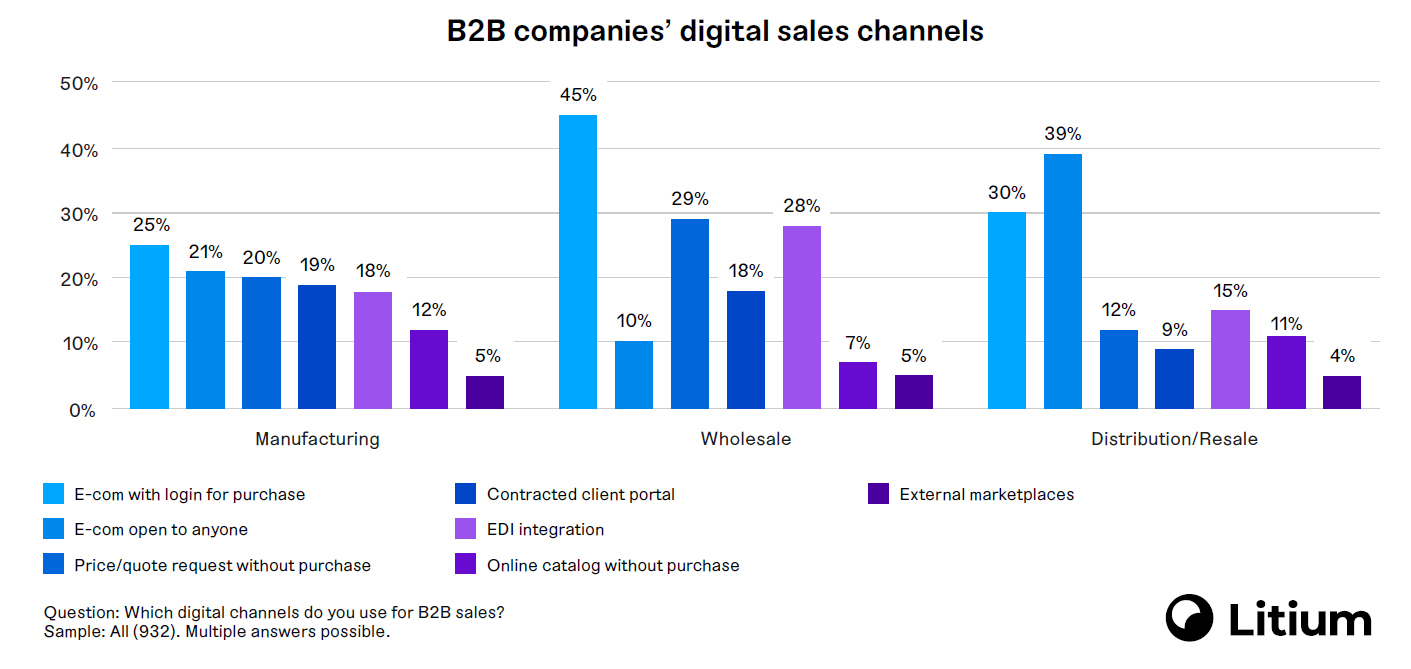
The driving forces for digitizing the business have shifted somewhat over the years. From simplifying the administration and streamlining the sales process has been at the top, the goal is now instead to increase sales by reaching new customers and/or markets and improving customer service.
68% of B2B companies now use digital channels to enable sales. 40% of these offer an e-commerce solution, with or without login for online purchases. For companies using digital sales channels, almost a third of total sales are digital.

More are planning to introduce a web shop or customer portal
Compared to 21% in 2023, 25% of companies that do not have an e-commerce solution today indicate that they plan to introduce digital sales either with a webshop or customer portal within 3 years. The vast majority who have no plans to digitize their sales state that it is because they do not consider their offering to be suitable for selling digitally. 32% indicate that their customers do not want to shop digitally. With a younger generation of buyers taking their place at the companies that are used to shopping online, there is a risk that customers will switch suppliers if the companies do not keep up and start offering an efficient digital shopping experience.
Interestingly, respondents have higher digital expectations of a B2B experience so that they would be able to resolve different aspects of self-service than they feel the companies they represent offer.
The digitization possibilities of the manufacturing industry
This year's report also focuses on the manufacturing industry, where you can see an even more complex sales process. There, digitization often means product customizations, flows for approving orders and after-sales service. Here, they often work with customized portals for self-service and building loyalty throughout the entire customer service cycle. The key to success surely lies in a balance between a digital experience and personal contact.
It is important to remember that digital commerce does not have to mean that the entire product portfolio is offered digitally. In many cases, the purchasing process for spare parts and consumables can be streamlined, which is often a significant part of sales.
AI's role in digital B2B sales is increasing
Today, 15% of companies use AI in some way to improve their digital business and 21% plan to use it. It can be anything from support for:
- Marketing – To create, optimize and translate content for SEO, product information, social media, web pages and other marketing materials.
- Data collection and analysis – To analyze customer behaviours, preferences and different segments. Analyze marketing campaigns and also trends and competitors.
- Customer service and chatbots – To streamline customer service by boosting customer service with AI through various virtual assistants and chatbots.
- Purchase recommendations/personalization – To personalize customer interactions and provide relevant product recommendations.
- Sales – To enable sales and provide support through lead generation, price relevance and more accurate forecasting.
Somewhat surprisingly, however, 56% state that they have no plans to use AI to develop customer experience or digital business.
Feel free to download and read the entire B2B report from Litium.
